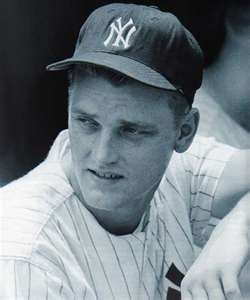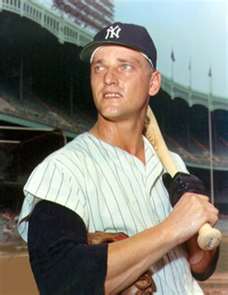 Even the most hardcore baseball fan might not realize it, but exactly 50 years ago today -- April 26, 1961 -- the very first chapter of one of the most improbable stories in the history of baseball got written.
Even the most hardcore baseball fan might not realize it, but exactly 50 years ago today -- April 26, 1961 -- the very first chapter of one of the most improbable stories in the history of baseball got written.
In the fourth inning of his team's 11th game of the season, New York Yankee right fielder Roger Maris took a Paul Foytak pitch deep into the right field stands at old Tiger Stadium. And while it may have been Maris' first HR that season, it would certainly not be his last.
Before the summer would end, Maris would go deep 60 more times and by doing so carve out for himself a slice of baseball immortality that, frankly, even induction into the Hall of Fame would not have brought him.
In the process, he would go on to surpass the single most hallowed mark in all of sports, one held by the most iconic and beloved athlete this country has ever known.
And what was remarkable about Maris breaking Babe Ruth's single-season HR record wasn't so much that he actually did it, though that was certainly amazing. It was that he did it with so many people rooting against him, and so many external forces conspiring to do whatever they could to stop him.
Compare that to 37 years later, in 1998, when all around baseball pitchers viewed being taken deep by either Mark McGwire or Sammy Sosa -- the bloated, Popeye-strong poster twins of the steroid era -- as something of a badge of honor. So much so, in fact, that at times it appeared they were tossing batting practice to the two sluggers on the off-chance they could one day tell their grandchildren about the role they played in that chemically enhanced full-frontal assault on Maris' remarkable record.
And that doesn't even take into account the thousands of fans who were rooting for McGwire and Sosa whenever they came to bat that season, even on the road, often imploring their pitcher to groove one, regardless of the score, so that they too might share in a little slice of history.
 Maris, on the other hand, did what he did in '61 virtually all alone, with little support, beyond that of his wife and teammates.
Maris, on the other hand, did what he did in '61 virtually all alone, with little support, beyond that of his wife and teammates.
In fact, as savagely cruel as the New York media and some Yankee fans were to him in 1961, and as little as the Yankee management and the Commissioner's office did to shield him from such savagery, you could argue Maris achieved something immeasurably more difficult than McGwire and Sosa, despite ten times the pressure and only a fraction of the support.
Looking back at what Maris was somehow able to accomplish in the summer of '61, I've realized that of all the things I resent about the hulking apes of baseball's steroid era, with their ridiculously inflated, video-game numbers, this is what I resent most: that in less than a decade's time, McGwire, Sosa, Barry Bonds, Rafael Palmiero, Manny Ramirez and their ilk -- each of whom, we reasonably be assume, saw himself as bigger than the game -- stole from us the yardsticks we once used to measure greatness.
They tossed aside our most hallowed touchstones, plowed under a century's worth of our game's history, and painted over one precious benchmark of ours after another.
What's more, they robbed us of ever again being able to experience another season like the magical summer of 1961, when a single, unassuming and remarkably decent man from North Dakota somehow found himself anointed by the baseball gods to measure his worth against the greatest sluggers the game had ever known.
Because thanks to those guys, the odds that we'll ever see someone make a legitimate run at the single-season HR record -- whatever the hell it is now -- are about the same as the likelihood that you'll be run over by a herd of yaks. In your bathroom. Today.
 But rather than worry about all baseball lost because Bud Selig chose to ingore a problem that proceded to strip-mine the game of its most precious numbers, I'll chose instead to spend today honoring Roger Maris and the very special gift he left on our doorstep 50 years ago.
But rather than worry about all baseball lost because Bud Selig chose to ingore a problem that proceded to strip-mine the game of its most precious numbers, I'll chose instead to spend today honoring Roger Maris and the very special gift he left on our doorstep 50 years ago.
And I'm taking a moment even as I write this -- as I hope you'll do as you read it -- to quietly celebrate the 50-year anniversary of the first of those 61; Roger Maris' very first step on what would prove to be the single most remarkable, courageous and unlikely six-month journey any baseball player has ever taken.

I remember the 61 season well and the contest between Maris and Mickey Mantle to see if one of them could top Ruth. It was the big story for about the second half of the season and Mantle was the favorite to do it if either of them could. There was big time pressure on Maris but he did it, hitting number 61 on the last day of the season. I saw it on TV, the stadium was only about half full. He never got the respect he deserved, he was a good player and a good man.
I was fortunate enough to have met Maris at an NLCS game in Atlanta in 1982. It was just a meeting-and-passing sort of thing. But he was warm, friendly and very patient with a friend of mine, who admittedly was a little tongue-tied and star-struck. I didn't see even a trace of the guy the New York media painted him out to be 20 years earlier. And to this day, when I think of Roger Maris, I think of him as the consummate teammate; a guy who was loyal, selfless and humble to a fault -- but who, more than anything else, knew how the game was supposed to be played, and played it that way every day of his career.
I wasn't fortunate enough to witness that season, but I do care deeply about the history of the game, and you touched on a great point in your piece here that speaks volumes to what the steroid era did to our game:
"...the single-season HR record — whatever the hell it is now..."
There was a time not too long ago that the number 61 was magical.
Steroids, or HGH, or any number of other PEDs took that away from ALL baseball fans.
Yeah, Rick. You're right. The one thing baseball had over all the other major sports was the "brand-value" of its numbers. And while that's still true to some degree, it's less so than it was just a generation ago.
As an inveterate devil's advocate, I ask, is this fervor against steroids just shooting ourselves in the foot? One of the justifications we hear for motor racing like NASCAR is that technology is being developed there which eventually migrates to make it safer for regular drivers in production cars.
But we are not allowing this for other sports based on muscle, reaction and health. I believe I could benefit from medical technology that allowed a 39 year old major leaguer to have the physicality of a 27 year old while retaining his hard won experience. Instead we make it illegal. There just might be anti-aging effects for these drugs that might save lives. Certainly they might make the lives of many more enjoyable and productive.
And then there are the arbitrary distinctions on what is allowed and what is not. Why is laser eye surgery allowed? Even if it gives a batter a Ted Williams-esque 20/10 eye sight? How about replacing an elbow ligament with a stronger tendon? Not only is the pitcher who gets this Tommy John surgery potentially stronger, but modern batters have to put up with pitchers, who in the past, would have been forced out of baseball.
It just seems to me that fighting medical technology tends to be arbitrary and doing that can end up as a bad thing.
Here's another argument. I remember when steroids first were discussed. The biggest argument against them was that they had side-effects that, long term, would harm the health of the player who took them. That was one of the original justifications for banning them. No one mentions that argument any more -- I assume because it no longer holds water. Once steroid use was banned, it became cheating and since cheating is bad, steroids became evil
Matt: We're just going to have to agree to disagree on this one.
One of the major points of differentiation between baseball and all the other major sports is that in baseball there is a sanctity and the timeliness to its numbers. And I'm not sure anyone who's not a big baseball fan could ever understand how learning the game's history and its seminal numbers is a virtual rite of passage for any young kid just getting into the game. Until the steroid era, baseball's numbers had always been a way of measuring greatness from one generation to the next.
And even if you're right, and steroids do no more harm than make individuals better for a period of time at the middle and end of their careers, what benefit is that to the game? And to the most devoted of its fans?
The price far outweighs the benefit And if you can't see what the loss of historical context would mean to future generations of baseball fans, if not the game's place in our collective consciousness, I'm not sure you'd ever be able to understand my explanation.
And as for steroids no longer being dangerous, just look out there tell me how many old professional wrestlers you see still alive and kicking.
Thanks for the comment, Matt, but as I said, on this one we're just going to have to agree to disagree.